Sidha Samajam
Siddha Samaj functions as a spiritual dharma organization dedicated to global welfare, peace, and fostering harmonious brotherhood. Its overarching objective revolves around promoting world welfare and peace, envisioning a society free from fear, bribery, and reliance on external dependencies.
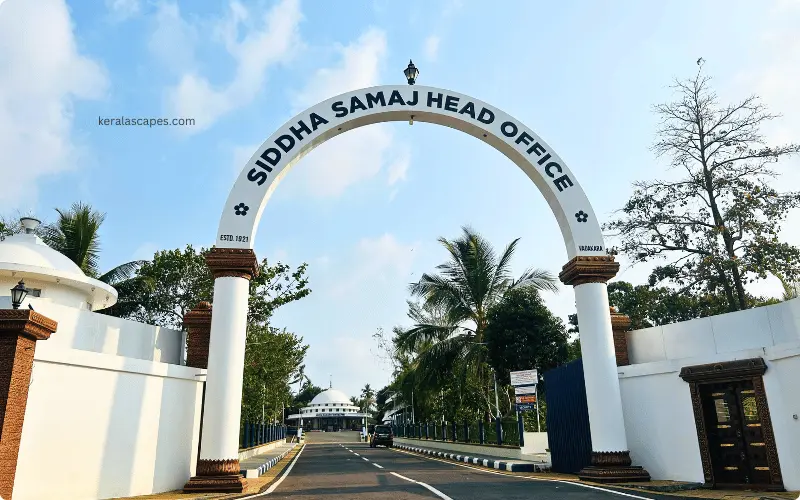
Paramahamsa Sivananda, Founder Sidha Samajam
Swami Sivananda Paramahamsa hailed from the town of Vatakara in Kerala, South India. His early years were marked by a profound observation—he witnessed the suffering people endured at the time of death, igniting within him a deep-seated desire to alleviate their plight.
Driven by this noble aspiration, he embarked on a journey that took him far and wide in search of a remedy. Through relentless determination and perseverance, Swami Sivananda Paramahamsa encountered what he termed “Siddha Vidya.” This spiritual philosophy taught that our true essence mirrors that of God and remains constant. According to this belief, true understanding dawns when one transcends emotions such as love and hate, which are mere constructs of the mind. In the state of sleep, the mind dissolves, rendering all individuals equal, regardless of their moral standing.
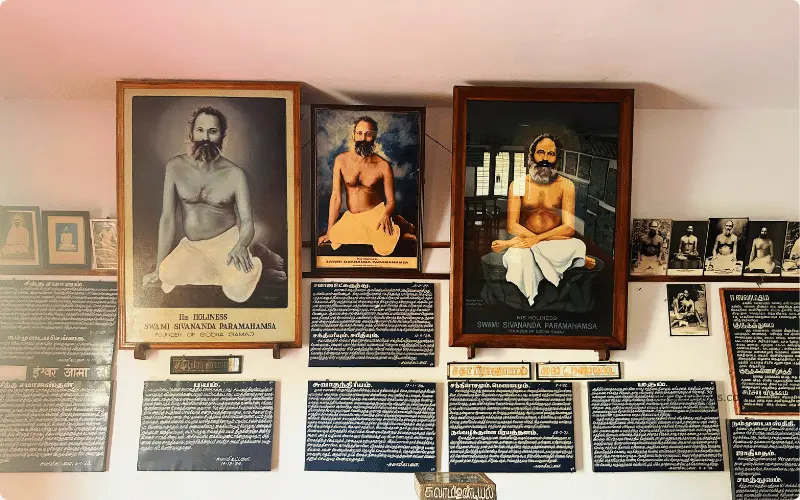
Firmly convinced that by mastering the mind and delving into the depths of one’s inner self, one could attain enlightenment, Swami Sivananda Paramahamsa propagated this philosophy widely. He founded the Siddha Samaj, a community aimed at disseminating his teachings and fostering personal growth.
Witnessing the transformative power of Siddha Vidya in his own life, Swami dedicated himself to guiding others. His altruistic endeavors transcended societal barriers, as he extended his assistance to individuals from diverse backgrounds. In 1921, he laid the foundation of the Siddha Samaj community, furthering his mission of spreading enlightenment.
Swami Sivananda Paramahamsa’s mortal journey concluded on June 21, 1949. His final resting place, known as Jeeva Samadhi, lies at the Siddha Samaj Head Office in Vatakara, Kerala.
Paramahamsa Shivananda Jeeva Samadhi Place
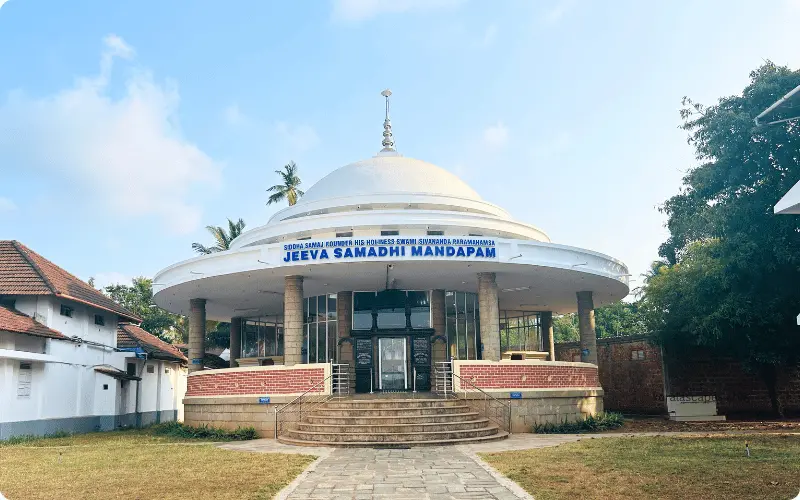
What is Sidha Vidya?
Siddha Vidya is a special way of using breathing exercises (Pranayama) to make our energy flow up in our bodies. It helps us feel connected to something bigger than ourselves, like superconsciousness. This practice includes different breathing exercises and deep thinking. It all started a long time ago when a very wise person named Paramashiva taught it to other wise people.
In the 1900s, a teacher named Paramahamsa Sivananda brought back this ancient knowledge after it had been lost for many years. One of his students, Thanjavur Swamigal, learned it and later passed it on to Kumaraswami. Thanjavur Swamigal was friends with Narayana Swami, and they both learned about Siddha Vidya from Paramahamsa Sivananda.
In the current global landscape, a noticeable lack of peace has captured widespread attention. The root cause of this prevailing unrest is attributed to the self-serving inclinations demonstrated by individuals, encapsulated in ideas of possession and exclusivity. Notions such as ‘I’, ‘mine’, ‘my wife’, ‘my children’, ‘my relatives’, and ‘my property’ underscore a mindset primarily motivated by personal gain. These individuals prioritize desires focused on personal acquisition and the welfare of their immediate circle, often disregarding or disadvantaging others whom they perceive as outsiders, unworthy of consideration or support. Unfortunately, those who adhere to such beliefs often find themselves isolated, eventually succumbing to silence.
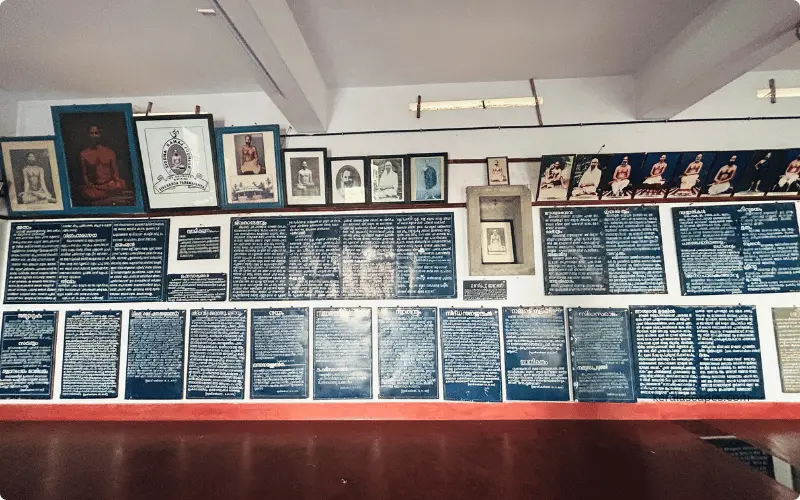
In sharp contrast, a closer examination of the Sidha Samajam community reveals a notable absence of such self-serving biases. Birds inhabit an environment characterized by tranquility, governed by principles of equality and camaraderie. Within their social framework, familial bonds transcend bloodlines, with designations like ‘mother’ and ‘father’ encompassing all members of their community. Within this egalitarian structure, all offspring are equally valued and nurtured, exemplifying a harmonious coexistence devoid of the divisive ego-driven pursuits that afflict human society.
Daily Routines of People Living in Siddha Ashram
In a community where strong morals and discipline are valued, the goal of living free from bribery is seen as achievable. This community strictly follows rules. They spend eight hours each day solely on spiritual practices called “japa.” These practices start early in the morning, from 3 am to 5:20 am, then again from 12 pm to 2:20 pm, later from 6 pm to 7 pm, and finally from 7:30 pm to 9:50 pm. The rest of the day is spent working on forest-related tasks.
Their diet is strictly vegetarian. They don’t drink alcohol or use drugs like ganja. They also avoid things like beedis, cigars, cigarettes, snuff, tobacco, pak, lime, tea, tamarind, and mustard. People are discouraged from using their caste or job titles as part of their names. They don’t believe in superstitions or special ceremonies. They only wear simple white clothes and don’t cut their hair.
Their belief system centers around a “God religion” and goes beyond caste distinctions, embracing a shared identity called the “human caste.” Essentially, they aim to live in harmony with nature.
Karthika Mahotsavam of Sidha Samajam
Apart from the birthday celebration of the founder Mahatma, no other festivities take place in the society. This celebration is known as the Kartika festival. Thousands of individuals come together on this day to partake in the festivities. Throughout the day, they are provided with meals three times. Additionally, there are sessions for Japa (Siddha education) and spiritual lectures. No other religious ceremonies are practiced during this time.
Sidha Samajam Revenue Sources
In this community, agriculture stands as the primary means of livelihood, complemented by trade and various professions. The concept of Samaj revolves around individuals engaging in work that sustains them independently, without relying on others for support. There’s no enforced obligation regarding work; individuals are free to pursue any occupation they are capable of. Collaboration is encouraged, with the fruits of labor shared equally among all members. Monetary compensation for work is absent, as the focus remains on upholding communal values.
Despite their commitment to agriculture on Samaja-owned land, the community faces challenges due to infertile soil and limited water resources, resulting in meager crop yields. Consequently, they have turned to the production and sale of Ayurvedic medicines to supplement their income.
Sivananda Vijayam Oushadhasala, Sidha Samajam
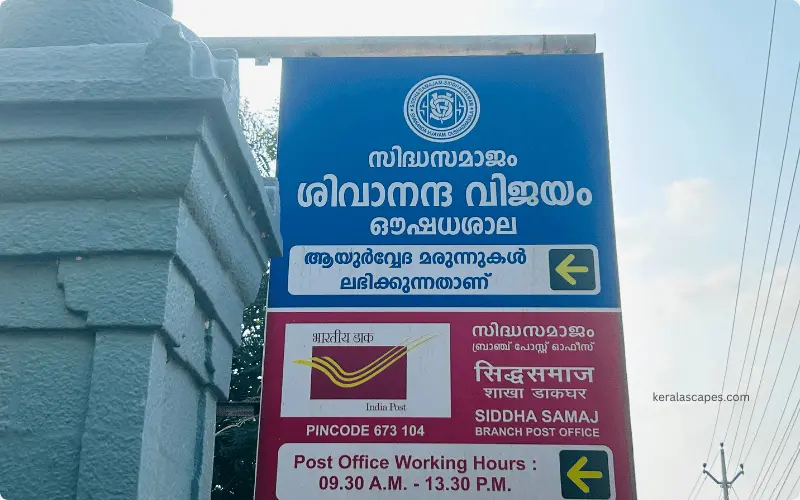
How to Join Sidha Samajam?
In the Samaj, individuals from all backgrounds—regardless of gender, caste, religion, or nationality—are welcomed as potential members. However, before one can become a member, it is essential to have undergone training in Siddha Vidyopa Desam. This training entails studying and adhering to the principles of Siddha Vidyarthi, establishing close ties with the community, and gaining a comprehensive understanding of its ethos.
Once these prerequisites are met, individuals who choose to dedicate their lives to the noble cause of the Samaj and are willing to abide by its principles must sever ties with their families and relinquish all personal property. Additionally, they must obtain a certificate from the Sub-Inspector or Sub-Inspector of Police confirming their non-affiliation with any political party. Upon submitting their application form and certificate to the president of the chosen ashram, they are required to reside there until the eligibility tests are completed.
During this period, individuals are regarded as equal and independent members of the ashram, free from prejudice or bias. This process reflects the Samaj’s commitment to its mission of uniting humanity under the banner of truth. By adhering to these principles, the society endeavors to contribute to the establishment and guidance of a global government, dedicated to promoting universal harmony and well-being.
How to Reach Sidhasamajam
Sidha Samajam Head Office Adress:
Siddha Samajam Head Office Vadakara
Siddha Samaj P.O. Makool peedika, Vatakara, Kerala, Pin: 673104
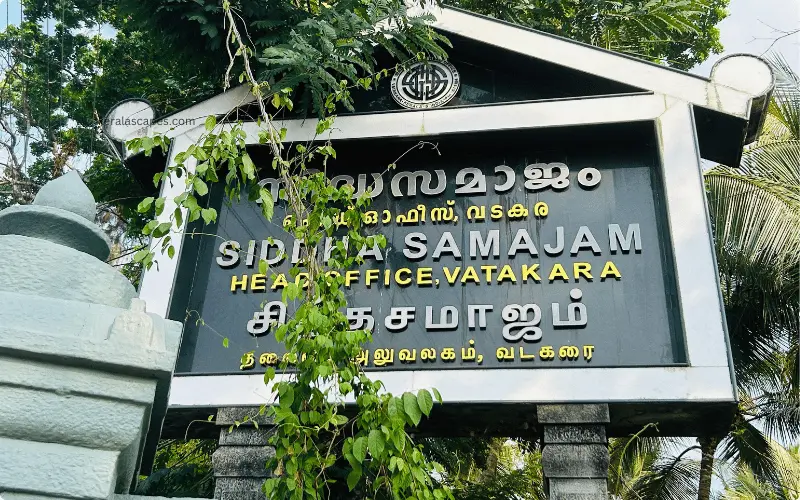
Branches of Sidha Samajam:
|
Sidha Ashramam Branch Name |
Address |
|
Vatakara Siddasharamam |
Siddha Samajam, PO, Vatakara, Kozhikode Dt 673 104 |
|
Iyyoor Siddasharamam |
Kururmathur, PO, Via Karimbam, Kannur Dt 670 142 |
|
Kayanna Siddasharamam |
Cherrukkad, PO, Via Athiyodi, Kozhikode Dt 673 527 |
|
Ammampalayam Siddasharamam |
Ammampalayam, PO, Via Attur, Salem Dt 636 141 |
|
Mannoorkkara Siddasharamam |
Paruthipally, PO, Via Kuttichal, Thiruvananthapuram Dt 695 574 |
Sidhasamajam Contact Number
Phone Number: +91 496 252 8551
Frequently Asked Questions (FAQs) on Lokanarkavu Temple
What is Siddha Samajam, and what are its objectives?
Who is Paramahamsa Sivananda, and what role did he play in Siddha Samajam?
What is Siddha Vidya, and how does it relate to Siddha Samajam?
What are the daily routines of people living in Siddha Ashram?
How does Siddha Samajam sustain itself financially?
What is Kartika Mahotsavam, and how does Siddha Samajam celebrate it?
How can one join Siddha Samajam?
What is the significance of the Sivananda Vijayam Oushadhasala in Siddha Samajam?
How can one reach Siddha Samajam or its branches?
Stay tuned to Kerala Scapes for more informative articles!
